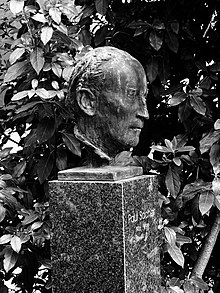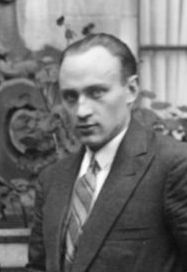Paul Sacher


Paul Sacher (born on April 28, 1906 in Basel ; died on May 26, 1999 there ) was a Swiss conductor and patron . In 1996, Sacher was the richest Swiss and third richest man in the world with private assets of around CHF 13 billion.
biography
Sacher came from a small family in Basel, already led a school orchestra at grammar school, studied musicology with Karl Nef and conducting with Felix Weingartner, and during this time (1926) he was the founder of the Basel Chamber Orchestra (BKO) and the Basel branch of the International Society for New Music (IGNM) . At his death, Sacher was considered the richest man in Switzerland.
family
In 1934 Sacher married the sculptor and art collector Maja Hoffmann-Stehlin , the widow of Emanuel Hoffmann , son of Fritz Hoffmann-La Roche , founder of the pharmaceutical company of the same name, Hoffmann-La Roche . Sacher was able to secure the lost majority of the shares for the family and headed the company for 60 years. The family group's private wealth was estimated at 37 billion Swiss francs and its personal wealth at 13 billion Swiss francs. Sacher had three children, Cornelia and Katharina Countess von Faber-Castell and Georg Schmid.
music
His means allowed him, whose main interest was music, to support important composers, often friends of his, such as Béla Bartók , Igor Stravinsky , Anton Webern and Alfredo Casella with composition commissions; thereby he promoted the music of the 20th century. However , he never gave the composers of the Vienna School Arnold Schönberg , Anton Webern and Alban Berg composition commissions. The Paul Sacher Foundation he founded today looks after the estate of several dozen composers, including Igor Stravinsky and Anton Webern. As a conductor, Sacher also conducted world premieres of the works he sponsored, such as Bartók's music for string instruments, percussion and celesta in 1937 , his Divertimento for string orchestra in 1939 , Ernst Krenek's symphonic piece for string orchestra in 1940 , Stravinsky's Concerto en Ré in 1947 , Hans Werner Henze's Sonata per archi in 1958 . In total, Sacher has awarded more than 250 composition commissions. Other contractors were Conrad Beck , Harrison Birtwistle , Boris Blacher , Willy Burkhard , Elliott Carter , Alfredo Casella , Henri Dutilleux , Wolfgang Fortner , Alberto Ginastera , Cristóbal Halffter , Paul Hindemith , Heinz Holliger , Arthur Honegger (for his 2nd symphony and his 4th symphony ) . Symphony ), Jacques Ibert , Witold Lutosławski , Gian Francesco Malipiero , Frank Martin a . a. for his Petite Symphonie concertante (1946), Bohuslav Martinů , Peter Mieg , Norbert Moret , Wolfgang Rihm , Rolf Urs Ringger , Michael Tippett , Sándor Veress , Wladimir Vogel , Jürg Wyttenbach and others. Sacher had no affinity for the late romantic music of Richard Strauss , but in order to help him in his economic and financial hardship after the German collapse, he commissioned him for the Metamorphoses for 23 solo strings , which on January 25, 1946 with the Collegium Musicum Zurich were premiered.
In 1933 Paul Sacher founded the Schola Cantorum Basiliensis . In 1941 the Collegium Musicum Zurich (CMZ) was founded. From 1935 to 1955 he was President of the Swiss Society for New Music (SGNM) . In 1972 Sacher received the Art Prize of the City of Basel , in 1997 an honorary doctorate from the Krakow Music Academy and the Maecenas award from the working group of independent cultural institutes. V. (AsKI) in Germany. In 1986 he stopped co-financing the Basel Chamber Orchestra, which was subsequently dissolved.
His systematic promotion of modern music is also explicitly recognized in the last chapters of Thomas Mann's novel Doktor Faustus , on the occasion of an appearance by the novel hero Adrian Leverkühn (who combines Mahler and Schönberg's traits) in Switzerland.
The novel The Beloved of the Mother of the Swiss writer Urs Widmer is also read as a roman with the clef against the background of Paul Sacher's life.
Sacher lived high above Pratteln in a house designed by Maja Sacher-Hoffmann-Stehlin ( Hofgut Schönenberg ) near Frenkendorf .
The Basel-based Paul Sacher Foundation archives and finances the musicological indexing of contemporary composers' estates with its own publications and research projects, in addition to that of Sacher himself, for example, that of the Mexican Conlon Nancarrow .
In recognition of his services to the music of the 20th century, Paul Sacher was elected honorary member of the International Society for Contemporary Music ISCM ( International Society for New Music ) in 1971 .
literature
- Ingrid Bigler-Marschall: Paul Sacher . In: Andreas Kotte (Ed.): Theater Lexikon der Schweiz . Volume 3, Chronos, Zurich 2005, ISBN 3-0340-0715-9 , p. 1549 f.
- Jürg Erni: Paul Sacher - musician and patron. Schwabe, Basel 1999, ISBN 3-7965-1096-5 .
- Christoph Keller : The prevented publication: Paul Sacher on his 80th birthday. In: Magma. 7/8, 1986.
- Ernst Kern : Seeing - thinking - acting of a surgeon in the 20th century. ecomed, Landsberg am Lech 2000, ISBN 3-609-20149-5 , p. 147 f.
- Ulrich Mosch (Ed.): Paul Sacher - Facets of a musical personality. Paul Sacher Foundation, Basel 2006, ISBN 3-7957-0454-5 .
- Lesley Stephenson: Symphony of Dreams - The Life of Paul Sacher. Rüffer & Rub, Zurich 2001, ISBN 978-3-907625-00-2 .
- Heidy Zimmermann: Sacher, Paul Oswald. In: New German Biography (NDB). Volume 22, Duncker & Humblot, Berlin 2005, ISBN 3-428-11203-2 , p. 324 f. ( Digitized version ).
Web links
- Literature by and about Paul Sacher in the catalog of the German National Library
- Regula Puskás: Sacher, Paul. In: Historical Lexicon of Switzerland .
- Sound documents by and about Paul Sacher in the catalog of the Swiss National Sound Archives
- Paul Sacher's biography on the Paul Sacher Foundation website
Individual evidence
- ^ A b Jürgen Schönstein: $ 14 million as a daily wage. In: The world . July 2, 1996, accessed January 13, 2020 .
- ↑ Ernst Kern: Seeing - Thinking - Acting of a surgeon in the 20th century. 2000, p. 147.
- ↑ Gerd Löhrer: The hit parade of the rich. In: TagesWoche . December 1, 2011, accessed January 13, 2020 .
- ↑ Manuel Brug: Paul Sacher's treasure trove of notes in the Basel house "Auf Burg". In: The world. September 26, 2001, accessed January 13, 2020 .
- ↑ About Paul Sacher, this animator of the music world. In: The world. May 19, 2001, accessed January 13, 2020 .
- ^ André Hoffmann-Roche. In: Handelszeitung . December 31, 1999, accessed January 13, 2020 .
- ↑ Ernst Kern: Seeing - Thinking - Acting of a surgeon in the 20th century. 2000, p. 147 f.
- ^ List of Sacher commissions. In: All conducting masterclasses. June 22, 2011.
- ↑ See also the list of works composed on behalf of Paul Sacher in Mosch, pp. 251–262.
- ↑ The artist always focuses on the work, Paul Sacher in conversation with Ferenc Bónis. November 17, 1995, Mosch, p. 65 and p. 264.
- ↑ On the history of the SGNM. iscm-switzerland.ch
- ↑ Reviews on Der Geliebte der Mutter at culturactif.ch
- ↑ Ernst Kern: Seeing - Thinking - Acting of a surgeon in the 20th century. 2000, p. 147.
- ^ Estates of around a hundred composers , paul-sacher-stiftung.ch, accessed February 23, 2020
| personal data | |
|---|---|
| SURNAME | Sacher, Paul |
| BRIEF DESCRIPTION | Swiss conductor and patron |
| DATE OF BIRTH | April 28, 1906 |
| PLACE OF BIRTH | Basel , Switzerland |
| DATE OF DEATH | May 26, 1999 |
| Place of death | Basel , Switzerland |
